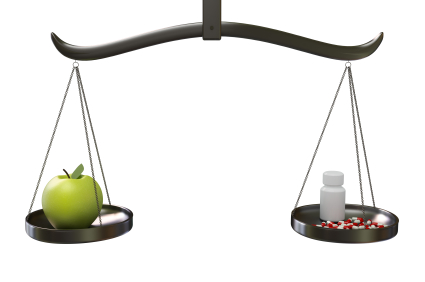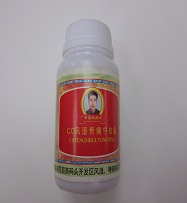| |
Information on oral corticosteroids
|
Preface |
Corticosteroids include natural hormones produced by the adrenal cortex in our body or their synthetic analogues. Our body naturally produces these hormones that are necessary to maintain good health. Corticosteroids are involved in a wide range of physiologic processes, including stress response, immune response and regulation of inflammation. They suppress inflammation and reduce the signs and symptoms such as swelling, redness, itching, and allergic reactions. They are commonly used to treat various inflammatory and immune system related diseases.
While corticosteroids are very powerful medicines, they may also cause side effects that can be very serious. In Hong Kong, oral corticosteroids are only available on prescription. They should be used under close supervision by healthcare professionals and their use should be balanced against their risk. |
|
 |
|
▲ back to top
Medicinal use |
The three main uses of corticosteroids include:
- Reducing inflammation – Inflammation is a reaction of our body against infection, irritant or injury. In allergic reactions, the immune system regards harmless substance as harmful and results in inflammation such as urticaria and atopic eczema. Corticosteroids decrease inflammation and allergic reactions.
- Suppressing the immune system – Corticosteroids can be used to treat a range of autoimmune conditions caused by malfunctions of one’s immune system, including rheumatoid arthritis and systemic lupus erythematosus.
- Replacement therapy – Corticosteroids are similar to natural hormones that are secreted by adrenal glands. Adrenal cortisols are essential to our body and insufficient production of these hormones, a condition known as Addison’s disease, can be life-threatening. Patient has to receive corticosteroids as replacement therapy.
|
Rheumatoid Arthritis
Rheumatoid Arthritis is an autoimmune disorder that causes inflammation of joints. Patients may suffer from joint pain and stiffness.
Corticosteroids help reducing joint inflammation and relieving joint pain and stiffness. They are usually used on a short-term basis, as long-term use of corticosteroids can have serious side effects.
|
|
|
|
|
|
|
Asthma
Asthma is a chronic inflammatory disorder of small airways in response to specific triggers which results in a narrowing of the airway and obstruction of airflow. It causes repeated episodes of wheezing, breathlessness, chest tightness, and nighttime and / or early morning coughing.
Corticosteroids are widely used for their anti-inflammatory properties in the management of asthma, and may also be beneficial in some patients with chronic obstructive pulmonary disease. Inhaled corticosteroids with reduced systemic activity are the most common medication for control of asthma; oral corticosteroids are generally only used in short courses, and at relatively low doses, to gain control of the disease.
Corticosteroids are available in different dosage forms. They include oral (e.g. tablet, capsules, liquid), external (e.g. eye/ear drops, nasal spray, inhaler and cream) and injectables (e.g. intramuscular and intraarticular injections). Common oral corticosteroids include prednisolone, prednisone,
dexamethasone, betamethasone and hydrocortisone. Prednisolone is the
corticosteroid most commonly used orally.
|
|
|
|
▲ back to top
Side effects |
Side effects and their severity associated with corticosteroids depend on dosage, types of drug used and duration of treatment. In general, low dose of inhaled or topical steroids have less serious side effects than oral or injected steroids. Long-term or inappropriate use of corticosteroids will increase the risk of adverse reactions. Doctors will use the most appropriate dosage after considering their risks and benefits. Patients are advised to follow doctor’s instructions in using the drugs and consult their doctors if they have any concerns or queries.
Some side effects may appear for short periods after treatment, such as:
- Fluid retention, causing swelling in your lower legs
- Rapid mood swings or change of mood
- Increased appetite that often leads to weight gain, with fat deposits in your abdomen, face and the back of your neck
When taking oral corticosteroids longer term, you may experience:
- Fatty deposits that develop in the face (moon face), stretch marks across the body and acne – these are some symptoms of Cushing’s syndrome
- Cataracts
- Glaucoma – an eye condition where excessive fluid gathers causing increased pressure inside the eye
- High blood sugar, which can trigger or worsen diabetes
- High blood pressure
- Increased risk of infection
- Loss of calcium from bones, which can lead to osteoporosis and fractures
- Menstrual irregularities
- Suppressed adrenal gland hormone production
- Thin skin, easy bruising and slower wound healing
Abrupt withdrawal after consuming corticosteroid for a prolonged period may lead to serious or fatal complications due to acute adrenal insufficiency. In general, doctors will gradually reduce the drug dose based on their patients’ condition. Patients should always follow the advice from healthcare professionals and should not stop the corticosteroid medications on their own.
|
|
▲ back to top
Reduce your risk of corticosteroid side effects |
Despite their side effects, corticosteroid drugs remain an important medical treatment. To get the most benefit with the least amount of risk, you should communicate with your doctor, be cautious about the signs and symptoms related to the side effects and adopt some lifestyle and behavioral modifications: |
|
 |
Communication with your doctor
- Corticosteroids should be used under medical supervision
- Inform your doctor of the individuals’ drugs and medical history because other drugs may interact with corticosteroids and some diseases may warrant for special precautions. Patients with increased risk of peptic ulcer formation may need to take antacids or other antiulcer agents concomitantly with oral corticosteroids
- Do not stop the drug or alter the dosage without medical supervision so as to avoid unnecessary side effects
- Inform other health professionals that you are currently under corticosteroids therapy
- Seek medical advice as soon as possible if you experience any side effects suspected to be related to corticosteroids, such as infection like symptoms, changes in mental state (e.g., feeling depressed and anxious) and symptoms of Cushing’s Syndrome (e.g., moon face, weight gain, hair growth on face, limbs and back , stomach pain and joint pain), etc.
- Consult the doctor for the appropriate form of steroids to be used like inhaled corticosteroids for the management of asthma to minimise systemic side effects
- Have regular medical follow-ups as advised by your doctor if you need to take oral corticosteroids on a long-term basis
- Seek your doctor’s advice before receiving live vaccine injection because long-term and high dose corticosteroid treatment may weaken your immunity and cause severe reactions
Method of taking oral corticosteroids
- Take oral corticosteroids as advised by your doctor. Oral corticosteroids are normally to be taken with or immediately after meals
Lifestyle and behavioral modification
- You will be more vulnerable to infection and should avoid close contact with anyone who has chickenpox, shingles or measles infection.
- You may need to reduce the calories intake you eat or increase your physical activity to balance undesirable weight gain. Exercise can help reduce muscle weakness and osteoporosis risks. In some cases, calcium and vitamin D supplements and other medications may be necessary to minimize bone thinning due to corticosteroids.
|
|
▲ back to top
|
Storage of drugs
Drugs should be stored in a cool dry place. Unless specified on the label, medicines should not be stored in refrigerators. Furthermore, drugs should be kept properly in places unreachable by children to prevent accidental ingestion.
|
|
|
▲ back to top
Proper use of health products |
There are many health products in the market claimed for pain relief or improve airway problems. It is not uncommon that patients with chronic diseases like rheumatoid arthritis and asthma consume these products for improving their health. Some patients purchased these products from overseas.
Department of Health previously received reports of patients feeling sick after taking these products. Some of these patients presented with symptoms of Cushing’s syndrome, i.e. weight gain, moon face, hair growth on their face, limbs and back or even high blood pressure and high blood sugar. Analysis of these products found that they were adulterated with corticosteroids. You may wish to refer to the “Products found to contain undeclared medicines” of the Drug Office website for more information.
Improper self-management of signs and symptoms by using health products just because of the products’ claims may affect the control of diseases. Consuming health products adulterated with western drug ingredients may also be harmful and sometimes even lead to life threatening consequences. Patients should always consult their family doctors, pharmacists or healthcare professionals and follow their treatment plan for management of diseases.
|
|


|
|
▲ back to top
|

